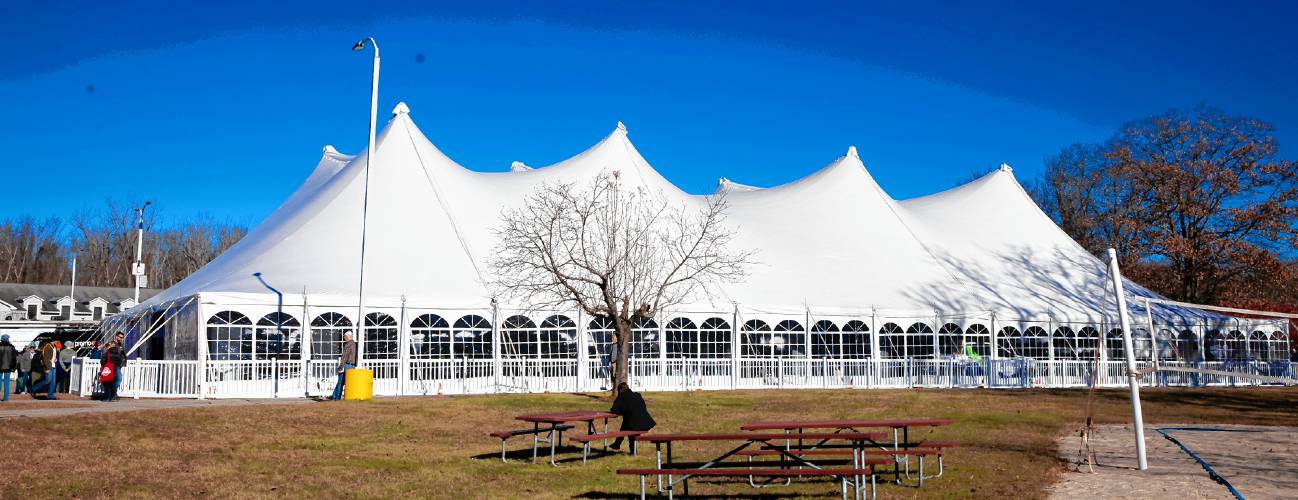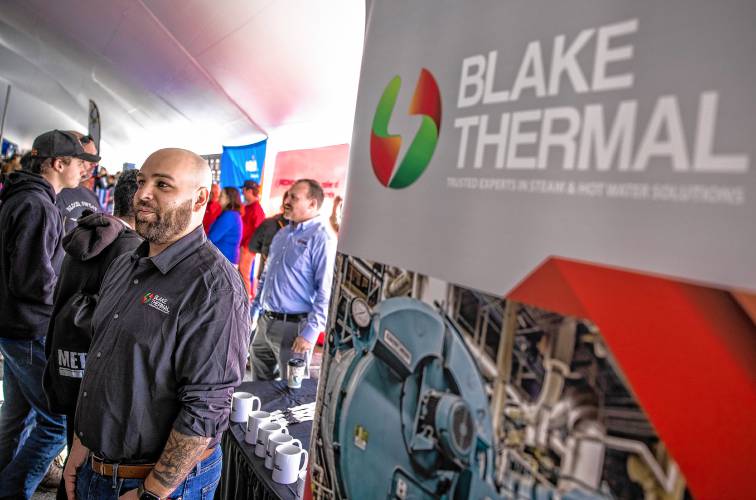For community colleges – is it ‘job or education’, or is it ‘job and education’?
|
Published: 11-20-2024 11:43 AM
Modified: 11-20-2024 7:55 PM |
A truck parked at the edge of the bustling mob scene during the Tradeapalooza job fair at NHTI encapsulated the difficult position that higher education faces these days.
Plastered on its side was a picture of two women talking. One asked where the other’s daughter was going to college. The response: “She’s not going to college. She’s going to a trade school!”
Concord’s community college – which offers two-year degrees and shorter-term certificate programs – was helping to amplify that message as it is scrambling to keep enrollment from falling.
“I don’t think we’re competitors. I’m not sure we’re really fighting for the same bodies,” said Dr. Mark Rubinstein, chancellor of the Community College System of New Hampshire. “There is always a tension between education vs. work. Part of what we do across the community college system is try to alleviate that tension by making those two parts of our students’ lives more compatible. We’re trying to find ways to remove what has historically been a tension for working adults.”
There certainly wasn’t any tension last Friday when the group Bringing Back the Trades drew many hundreds, perhaps thousands, of teens, parents and young adults to a four-hour event: It was all job fair. The event featured food trucks, bands, comedians and Gov.-elect Kelly Ayotte talking with TV personality Mike Rowe of “Dirty Jobs” fame, but the centerpiece was three dozen companies looking for employees, many of which you’ve never heard of before.
“We want to get some guys at a young age, get them excited about the business,” said Craig Stamand who does inside sales for Blake Thermal of Bow, a company that services and maintains the huge boilers that heat industrial and commercial buildings. “A lot of older guys are retiring and there’s no one to replace them. When these guys are gone, who’s going to teach the new people?”
But although manufacturers and other companies in the trades need specialized skills – if you’ve got a gasfitter’s license, Blake Thermal wants to hear from you – they also need the soft skills college is designed to teach, like how to cope in a new situation.
“They need to learn how to take initiative,” said Corey Coleman, director of education for PH Electric in Plaistow. “When they start they feel like they’re in the way, that they’re not productive.”
Article continues after...
Yesterday's Most Read Articles
 House committee defunds relief program for mothers and children, spares SNAP incentives
House committee defunds relief program for mothers and children, spares SNAP incentives
 No high-speed E-ZPass at Hooksett tolls for at least two months
No high-speed E-ZPass at Hooksett tolls for at least two months
 New Hampshire law enforcement to step up traffic enforcement on Route 106
New Hampshire law enforcement to step up traffic enforcement on Route 106
 Schools in Lakes Region explore creating a special education school to bring down costs
Schools in Lakes Region explore creating a special education school to bring down costs
 Work continues on new state psychiatric hospital in Concord
Work continues on new state psychiatric hospital in Concord
 House committee reverses vote, adopts prohibition on DEI activities and spending
House committee reverses vote, adopts prohibition on DEI activities and spending
The company has its own 600-hour apprenticeship program, accredited for electrician licenses in Massachusetts and New Hampshire, but it still appreciates what high school and college can teach, from English to math to an understanding of the world.
NHTI is no newcomer to balancing the humanities and the hands-on – after all, it was New Hampshire Technical Institute for the first 42 years of its existence until changing its name in 2007 to emphasize academics.
“We’ve adapted over time. The growth of 2-year degrees was a significant change,” said Rubinstein. “But we’ve always been adapting to what students need and what employers need.”
“That’s the beauty of the community college system. We offer a variety of levels for a student to enter into,” said Beth Doiron, director of college access programs for the system. Those include apprenticeship and mentorship programs aligned with specific companies as well as certificates in certain fields, which is a one-year, full-time program requiring 30 credits vs. 60 credits for an associate degree.
Consider welding. “A welding degree would have more English and Social Studies and other general education courses” than a welding certificate, Doiron said. “A certificate is less about soft skills, moving toward management responsibilities.”
The production isn’t huge in the overall picture. “HVAC (heating, ventilation, air conditioning) degrees are graduating 15 or 20 students a year; automotive 50 or 60 students a year. Probably half that in certificate programs,” said Rubinstein. That’s out of an estimated 24,000 people taking any kind of course in the state’s seven community colleges and four academic training centers.
Increasing those numbers was the point of the Tradeapalooza show but years of scrambling to hire enough help, especially since the pandemic, has taught companies that they have to do more themselves.
“We have new internship and new mentorship programs,” said Lindsey Callan, people operation specialist for MetroWalls, a commercial drywall and framing company in Manchester, at her company’s booth during the trade show. “We’ve got to get the younger generation interested,” she said, and that includes getting more women into the field.
For NHTI, the high-profile show was a chance to tweak its image at a time when sentiment among many politicians, particularly Republicans, is turning against the idea of higher education.
“Our effort is to be nimble and responsibe to fill the need that students have and employers have,” said Rubinstein. He pointed to nursing programs, which have been added or expanded by many two- and four-year colleges to meet demand.
“About 1 in 5 of our nursing students already hold a bachelor’s degree,” he said, but have come to NHTI as part of a career change. “We can serve as a bridge between where students are and where they want to be.”
David Brooks can be reached at dbrooks@cmonitor.com













 Henniker ponders what is a ‘need’ and what is a ‘want’
Henniker ponders what is a ‘need’ and what is a ‘want’ Boscawen residents vote to fund major renovation of public works building
Boscawen residents vote to fund major renovation of public works building ‘Voting our wallets’: Loudon residents vote overwhelmingly against $1.7M bond for new fire truck
‘Voting our wallets’: Loudon residents vote overwhelmingly against $1.7M bond for new fire truck In Pembroke, Education Freedom Accounts draw debate, voters pass budget
In Pembroke, Education Freedom Accounts draw debate, voters pass budget
